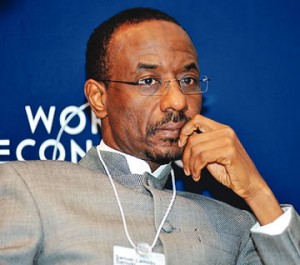
Nigerian Central Bank governor, Lamido Sanusi is attending the 2014 World Economic Forum in Davos, Switzerland.
Davos, Switzerland (Reuters) – Nigerian central bank governor Lamido Sanusi said on Thursday that the bank would continue to seek a stable exchange rate for as long as its foreign exchange reserves can support it, but he warned that Nigeria’s oil savings were rapidly running out.
“My strong view is that a stable currency is absolutely critical for price stability and financial stability in general,” he told the Reuters Global Markets Forum, an internet chatroom, in Davos.
He ruled out a devaluation of the naira because it would “not affect the current account balance, given the highly inelastic nature of our imports and the dominance of oil”.
He said Nigeria’s oil savings in the Excess Crude Account (ECA) had now fallen to just $2.5 billion, compared with $11.5 billion a year ago, and that until they were replenished there would little room for a policy rate cut below the current 12 percent benchmark.
“We should continue to seek a stable exchange rate for as long as the reserves and monetary conditions can support this,” Sanusi said.
He is in the Swiss ski resort attending the World Economic Forum.
Central bank lifted the cash reserve requirement on public sector deposits held by banks on Tuesday, seeking to stabilise the naira and reflecting its concern about loose fiscal policy ahead of elections next year.
Nigeria faces a hotly contested presidential poll early in 2015, and there is a bitter dispute within the ruling party about whether or not President Goodluck Jonathan should run again.
Nigeria’s fiscal position always slips around election time, when spending on patronage to secure seats surges, but this one is expected to be the most closely fought since the end of military rule in 1999.
Foreign exchange reserves were $43.26 billion as of January 20, down 4.4 percent from 45.26 billion a year ago, despite continued high oil prices.
Sanusi has repeatedly urged the government to do more to reign in spending.


